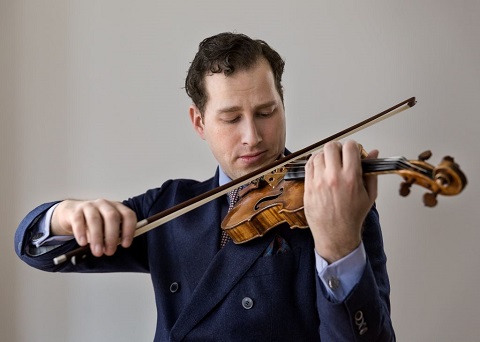 United States Elgar, Tchaikovsky: Nikolaj Szeps-Znaider (violin), Philadelphia Orchestra / Stéphane Denève (conductor), Verizon Hall, Kimmel Center, Philadelphia, 4.5.2019. (BJ)
United States Elgar, Tchaikovsky: Nikolaj Szeps-Znaider (violin), Philadelphia Orchestra / Stéphane Denève (conductor), Verizon Hall, Kimmel Center, Philadelphia, 4.5.2019. (BJ)

Elgar – Violin Concerto in B minor Op.61
Tchaikovsky – Symphony No.5 in E minor Op.64
Elgar’s own interim estimate of his Violin Concerto, conveyed in a letter to his friend Frank Schuster when it was almost finished, was ‘it’s good! awfully emotional! too emotional but I love it’. In this work, ‘full of romantic feeling’, as the composer avowed, yet organized with masterly skill and insight, he achieved one of the three supremely great classical violin concertos. The other two are Beethoven’s and Brahms’s — for Mozart’s unquestionably beautiful contributions to the genre are relatively small in scale, and most later violin concertos have eschewed the full-sized classical form that prefaces the soloist’s first entry with a spacious orchestral ritornello.
Like many masterpieces, this Violin Concerto is studded with trouvailles: crystal-clear strokes of invention (or discovery) that take possession of the ear and mind the moment you truly perceive them, and never lose that quality of total conviction no matter how many times you encounter them. The first movement begins with a six-note question. It would have been easy for Elgar to answer the question at once. But this is only the ritornello. Its function is to propose, not to dispose. Accordingly, the orchestra goes on asking questions and putting forward ideas, one after another of them, hovering around many keys certainly, but never—true to the Brahmsian precedent — settling in any one tonal area for long. And thus it is the most natural and seemingly inevitable thing in the world, when the initial question is asked again a few minutes later, for it to be answered this time by the solo violin with magisterial calm and certainty.
Those qualities were established vividly the moment Nikolaj Szeps-Znaider put his bow to the legendary Guarneri del Gesù violin of about 1741 that he is fortunate enough to have on extended loan from the Royal Danish Theater — the very instrument on which, in 1910, Fritz Kreisler premiered the work. The seemingly effortless mastery his entry established proved to be prophetic of the Danish violinist’s performance as a whole. This was as compelling a realization of Elgar’s musical vision as I can remember hearing, generously responsive in expression, gorgeous in tone, and impeccable in technique throughout. The tender and introspective central Andante provided a welcome breathing space between the first movement’s urgent explorations and a finale whose exultant virtuosity debouches into a dreamlike accompanied cadenza that is the work’s most original and captivating trouvaille.
The soloist’s part in all this benefitted, furthermore, from an account of Elgar’s brilliant orchestral score led with no less impressive skill and artistry by Stéphane Denève, whose tenure as principal guest conductor has one more season to run. And it speaks to his quality and the stature of this great orchestra that Tchaikovsky’s so much more familiar Fifth Symphony, after intermission, came as just as inspiriting an artistic experience as had been provided by the relative rarity that preceded it.
Rather as Riccardo Muti used to do in the 1980s, Denève demonstrated afresh that the effect of a score too often damaged by unrestrained striving for sheer loudness is greatly enhanced when the performers aim for proportion rather than mere size of sound. It was the richly saturated tone and gracefully shaped line of the strings, nicely contrasted with eloquent phrasing from the woodwinds and the tautly rhythmic incursions of the heavy brass, as well as Jennifer Montone’s finely focused horn solo and timpanist Don Liuzzi’s characteristic balance of crispness with delicacy, that rather than any excessive onslaught of decibels made this too a performance to treasure.
Bernard Jacobson